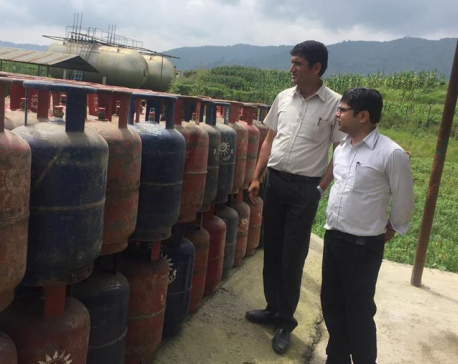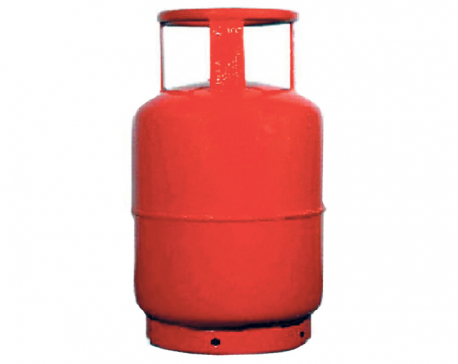
OR
Expiry date of LPG cylinders lacks monitoring
Published On: January 6, 2018 08:56 AM NPT By: Kushal Basnet.
KATHMANDU, Jan 6: The government’s monitoring agencies have not been inspecting the expiry date of LPG cylinders -- the household cooking gas cylinders -- in the market, which is an obligatory safety practice for such cylinders, it has been learned.
They have been pointing fingers at each other as being the body responsible to monitor the standard of these cylinders.
Nepal Bureau of Standards and Metrology (NBSM) and Department of Supplies Management and Protection of Consumer Interest (DoSMPCI), which are the government bodies responsible to monitor standard of goods and services in the market, have said that they have not conducted any sort of inspection on the expiry dates of the cylinders in the market.
Expiry date actually means the due date for mandatory tests like hydrostatic tests of the cylinders. The hydrostatic test is a scientific examination to examine the strength of a cylinder and presence of possible leakage in it.
NBSM, on Friday, raided three gas plants of Banepa -- Chandeshwori Gas, Surya Gas, and Sagarmatha. The raid found out that Chandeswori Gas plant was sending cylinders to the market without conducting hydrostatic test. The due date printed on the cylinders could be trusted only if they have gone through the hydrostatic test.
However, this first-ever inspection at the bottling plants is in no way sufficient to ensure safety of the household cooking gas cylinders as there is no monitoring of the available cylinders in the market.
As per the standards, expired cylinders are not safe for use and can cause lethal accidents.
NBSM provides Nepal Standard (NS) certification to the gas bottling plants, but does not conduct any sort of market-watch regarding the expiry date of the cylinders, according to the officials of the bureau.
“We have not done any sort of market monitoring regarding the maintenance of the expiry dates,” said Romi Manandhar, deputy director general of NBSM. “We are not monitoring the cylinders in the market since we are not associated with the market activities.”
DoSMPCI, which is the concerned authority for market regulation and consumer welfare, has said that it was not the only body responsible for monitoring the expiry date of gas cylinders.
“We have not conducted raids or inspections about expiry date of cylinders since we are not the only body responsible for it,” said Laxman Shrestha, director of DoSMPCI. “We are to coordinate only if inspections are carried out by the bureau of standards [NBSM].”
On the other hand, Nepal Oil Corporation (NOC) has also said that it was not responsible to monitor the expiry date of cylinders in the market.
“We are not obliged to monitor whether the due dates of gas cylinders in the market are valid or not,” said Birendra Goit, spokesperson of the NOC. “It comes under NBSM’s activities.” Not having one government body tasked with regulating the standards of cooking gas and transportation fuel has emerged as a serious issue in recent days. The state-owned NOC is more a business body than a regulator. The NOC supplies LPG to the bottlers who fill it in cylinders and sell in the market.
On one of three side stems on top of the cylinder, code for expiry date of cylinders is written as a combination of an alphabet among ‘A’, ‘B’, ‘C’ and ‘D’ and a two digit number.
The two-digit number stands for the year of expiry date, whereas the alphabet stands for the quarter of the year: A for January-March quarter, B for April-June, C for July-September, and D for October-December.
It implies that if ‘D.19’ is written on one of the three side stems of cylinder in your kitchen, the expiry date of your cylinder is October-December quarter of 2019.
You May Like This

Monitoring team seals LPG cylinders of Surya Gas
KATHMANDU, Aug 30: It has been revealed that Surya Gas Industry refilled cooking gas cylinders of substandard quality without conducting... Read More...

House panel tells govt to test quality of all LPG cylinders
KATHMANDU, July 6: The Industry, Commerce and Consumer Welfare Protection Committee of the parliament on Tuesday directed the government to... Read More...

NOC still profits Rs 111.7 per LPG cylinder
KATHMANDU, Aug 9: The recent price adjustment for Liquefied Petroleum Gas (LPG) has brought a huge profit margin for Nepal Oil... Read More...





Just In
- MoHP cautions docs working in govt hospitals not to work in private ones
- Over 400,000 tourists visited Mustang by road last year
- 19 hydropower projects to be showcased at investment summit
- Global oil and gold prices surge as Israel retaliates against Iran
- Sajha Yatayat cancels CEO appointment process for lack of candidates
- Govt padlocks Nepal Scouts’ property illegally occupied by NC lawmaker Deepak Khadka
- FWEAN meets with President Paudel to solicit support for women entrepreneurship
- Koshi provincial assembly passes resolution motion calling for special session by majority votes






_20220508065243.jpg)






Leave A Comment